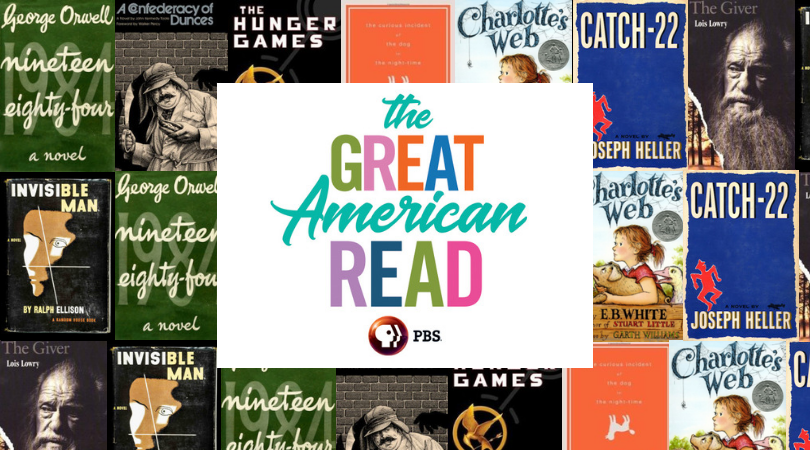
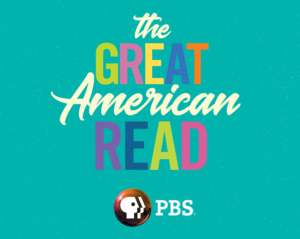
The quest to find the country’s most beloved book continued at pace last night with “Heroes,” the second themed episode in PBS’ The Great American Read—a new eight-part series that explores and celebrates the power of reading, told through the prism of America’s 100 favorite novels.
“Heroes” (which featured interviews with Seth Meyers, Shaquille O’Neal, Sarah Jessica Parker, James Patterson, Jason Reynolds, Parul Seghal, Baratunde Thurston, Kevin Young, Venus Williams and others) reintroduced us to a selection of literature’s most iconic embattled protagonists—from Katniss Everdeen to Winston Smith, Yossarian to Ignatius J. Reilly—and examined how these everyday heroes and anti-heroes find their inner strength, overcome challenges, and rise to the occasion.
As we’ll be doing the day after each week’s themed episode from now until the grand finale on October 23, we looked back through our Classic Reviews Archive to show you what the critics said about some of these legendary heroic journeys.
*
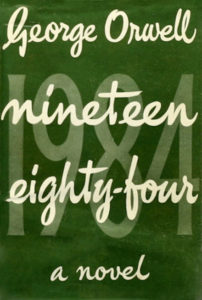
Nineteen Eighty-Four by George Orwell
Perhaps one did not want to be loved so much as to be understood.
“Nineteen Eighty-Four goes through the reader like an east wind, cracking the skin, opening the sores; hope has died in Mr Orwell’s wintry mind, and only pain is known. I do not think I have ever read a novel more frightening and depressing; and yet, such are the originality, the suspense, the speed of writing and withering indignation that it is impossible to put down. The faults of Orwell as a writer—monotony, nagging, the lonely schoolboy shambling down the one dispiriting track—are transformed now he rises to a large subject.
…
“The duty of the satirist is to go one worse than reality; and it might be objected that Mr Orwell is too literal, that he is too oppressed by what he sees, to exceed it. In one or two incidents where he does exceed, notably in the torture scenes, he is merely melodramatic: he introduces those rather grotesque machines which used to appear in terror stories for boys. But mental terrorism is his real subject.
…
“For Mr Orwell, the most honest writer alive, hypocrisy is too dreadful for laughter: it feeds his despair. Though the indignation of Nineteen Eighty-Four is singeing, the book does suffer from a division of purpose. Is it an account of present hysteria, is it a satire on propaganda, or a world that sees itself entirely in inhuman terms? Is Mr Orwell saying, not that there is no hope, but that there is no hope for man in the political conception of man?”
–V.S. Pritchett, The New Statesman, June 18, 1949
*
A Confederacy of Dunces by John Kennedy Toole
I mingle with my peers or no one, and since I have no peers, I mingle with no one.
“The problem with writing about a funny book, like a good joke, is that you can’t really describe it, you just have to retell it. And criticism is never so clearly a matter of taste as when it is applied to humor. I don’t like the Three Stooges or Mel Brooks or even, except occasionally, Woody Allen. I am the kind of surly reader who doesn’t laugh out loud at books, even at passages I find genuinely funny. I found myself laughing out loud again and again as I read this farcical, ribald book.
…
“[Ignatius] is the quintessential pessimist who is continually offended by the world ill-equipped to recognize his genius. An obese, mephitic 30-year-old M.A., he lives with his mother and spends most of his time in his room scribbling his orotund philosophy and history of society in Big Chief tablets, coming out only to grab an occasional Dr. Nut from the fridge, watch television, or visit the local movies to complain loudly about the lack of taste and decency being presented on the screen. He is one of the most repelling, entertaining, and, is some strange way, sympathetic characters I have ever encounteredc.
The setting is New Orleans, where Toole renders as surrealistic a social landscape as one would ever hope to find, peopled by characters whose dialects only gain in comic effect by clashing with Ignatius’ educated and bombastic diction.
The first and only novel completed by John Kennedy Toole before his death in 1969, this book is only now being published because Toole’s mother brought a manuscript to Walker Percy, who reluctantly began to read it and soon realized that what he had in hand was ‘a great rumbling farce of Falstaffian dimensions.’
Toole doesn’t use his characters as convenient targets for falling objects of one sort or another. Blacks, WASPS, Homosexuals, policemen, conservatives, radicals, and more are laughable here, but they are more than caricatures or stereotypes. Toole has succeeded in creating characters with comic essenses, whose laughability is somehow a predetermined feature, like an unusually large nose, so that while they proceed through life with something close to the same proportion of problems, successes, logic and absurdity as the rest of us, we can’t help but laugh at what makes them incongruous, or feel sympathetic toward what makes them human.
The title is from Jonathan Swift: ‘When a true genius appears in the world, you may know him by this sign, that the dunces are all in confederacy against him.’ There is a sort of genius in Ignatius’ ability to survive, and, in fact, to better his antagonists, and there was an unmistakable comic genius in the creator of this book.”
–Brad Owens, The Christian Science Monitor, June 4, 1980
*
Catch-22 by Joseph Heller
Just because you’re paranoid doesn’t mean they aren’t after you.
“Catch-22, by Joseph Heller, is not an entirely successful novel. It is not even a good novel. It is not even a good novel by conventional standards. But there can be no doubt that it is the strangest novel yet written about the United States Air Force in World War II. Wildly original, brilliantly comic, brutally gruesome, it is a dazzling performance that will probably outrage nearly as many readers as it delights. In any case, it is one of the most startling first novels of the year and it may make its author famous … Catch-22 is realistic in its powerful accounts of bombing missions with men screaming and dying and planes crashing. But most of Mr. Heller’s story rises above mere realism and soars into the stratosphere of satire, grotesque exaggeration, fantasy, farce and sheer lunacy. Those who are interested may be reminded of the Voltaire who wrote Candide and of the Kafka who wrote The Trial.
“Catch-22 is a funny book—vulgarly, bitterly, savagely funny. Its humor, I think, is essentially masculine. Few women are likely to enjoy it. And perhaps ‘enjoy’ is not quite the right word for anyone’s reaction to Mr Heller’s imaginative inventions. ‘Relish’ might be more accurate. One can relish his delirious dialogue and his ludicrous situations while recognizing that they reflect a basic range and disgust.
Joseph Heller’s key sentence is this: ‘Men went mad and were rewarded with medals.’ His story is a satirical denunciation of war and of mankind that glorifies war and wages war cruelly, stupidly, selfishly. So Mr. Heller satirizes among other matters: militarism, red tape, bureaucracy, nationalism, patriotism, discipline, ambition, loyalty, medicine, psychiatry, money, big business, high finance, sex, religion, mankind and God.
Yossarian was brave once. But he had cracked up and couldn’t face any more bombing missions: ‘He had decided to live forever or die in the attempt, and his only mission each time he went up was to come down alive.’ Unfortunately, the colonel, who wanted to be a general, kept raising the number of compulsory missions. By the time they reached ninety everybody had cracked up and insanity prevailed.
More than a score of Yossarian’s friends and enemies play prominent parts in his story and each gets one or more chapters to himself. Each is a marvel of fear, cupidity, lust, ambition, dishonesty, stupidity or incompetence. The war effort—defeating Hitler, supporting the infantry—meant nothing to anybody. Blatant self-interest was the only motive on the strange Island of Pianosa … Catch-22 will not be forgotten by those who can take it.”
–Orville Prescott, The New York Times, October 23, 1961
*
Charlotte’s Web by E.B. White
“Why did you do all this for me?” he asked. “I don’t deserve it. I’ve never done anything for you.”
“You have been my friend,” replied Charlotte. “That in itself is a tremendous thing.”
“E. B. White has written a book for children, which is nice for us older ones as it calls for big type. The book has liveliness and felicity, tenderness and unexpectedness, grace and humor and praise of life, and the good backbone of succinctness that only the most highly imaginative stories seem to grow.
Wilbur is of sweet nature—he is a spring pig—affectionate, responsive to moods of the weather and the song of the crickets, has long eyelashes, is hopeful, partially willing to try anything, brave, subject to faints from bashfulness, is loyal to friends, enjoys a good appetite and a soft bed, and is a little likely to be overwhelmed by the sudden chance for complete freedom.
Charlotte A. Cavitica (‘but just call me Charlotte’) is the heroine, a large gray spider ‘about the size of a gumdrop.’ She has eight legs and can wave them in friendly greeting. When her friends wake up in the morning she says ‘Salutations!’—in spite of sometimes having been up all night herself, working. She tells Wilbur right away that she drinks blood, and Wilbur on first acquaintance begs her not to say that.
Another good character is Templeton, the rat. There is the goose, who can’t be surprised by barnyard ways. ‘It’s the old pail-trick, Wilbur. . . . He’s trying to lure you into captivity-ivity. He’s appealing to your stomach.’ The goose always repeats everything. ‘It is my idio-idio-idiosyncrasy.’
What the book is about is friendship on earth, affection and protection, adventure and miracle, life and death, trust and treachery, pleasure and pain, and the passing of time. As a piece of work it is just about perfect, and just about magical in the way it is done. What it all proves—in the words of the minister in the story which he hands down to his congregation after Charlotte writes ‘Some Pig’ in her web—is ‘that human beings must always be on the watch for the coming of wonders.’ Dr. Dorian says in another place, ‘Oh no, I don’t understand it. But for that matter I don’t understand how a spider learned to spin a web in the first place. When the words appeared, everyone said they were a miracle. But nobody pointed out that the web itself is a miracle.’ The author will only say, ‘Charlotte was in a class by herself.’
‘At-at-at, at the risk of repeating myself,’ as the goose says, Charlotte’s Web is an adorable book.”
–Eudora Welty, The New York Times, October 19, 1952
*
The Curious Incident of the Dog in the Night-Time by Mark Haddon
All the other children at my school are stupid.
Except I’m not meant to call them stupid, even though this is what they are.
“Mark Haddon’s stark, funny and original first novel, The Curious Incident of the Dog in the Night-Time, is presented as a detective story is presented as a detective story. But it eschews most of the furnishings of high-literary enterprise as well as the conventions of genre, disorienting and reorienting the reader to devastating effect … Christopher tells us all we need to know about his condition without reference to medical terminology—just as well, since the term ‘autism’ encompasses a variety of symptoms and behavioral problems that are still baffling behavioral scientists … Haddon manages to bring us deep inside Christopher’s mind and situates us comfortably within his limited, severely logical point of view, to the extent that we begin to question the common sense and the erratic emotionalism of the normal citizens who surround him, as well as our own intuitions and habits of perception … One of the subtle ironies of the book is that young Christopher is ultimately far more hard-boiled than any gumshoe in previous detective fiction…Christopher’s skewed perspective and fierce logic make him a superb straight man, if not necessarily a stellar detective … The gulf between Christopher and his parents, between Christopher and the rest of us, remains immense and mysterious. And that gulf is ultimately the source of this novel’s haunting impact.
–Jay McInerney, The New York Times Book Review, June 15, 2003
*
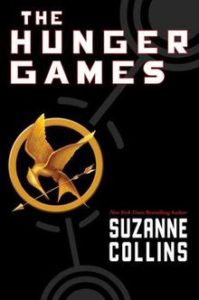
The Hunger Games by Suzanne Collins
You don’t forget the face of the person who was your last hope.
“While some young adult novels are content to read the way bad sci-fi movies look, [this] book transcends [its] premise with a terrifyingly well-imagined future and superb characterization.
…
“The archetype of the girl survivalist is familiar—she’s tough and resourceful, but kind and sentimental. We are put on notice that Katniss is something different in Chapter 1, when she describes a lynx who followed her around while she hunted. In many books, that lynx would be Katniss’s best friend. But not this one: ‘I finally had to kill the lynx because he scared off game. I almost regretted it because he wasn’t bad company. But I got a decent price for his pelt.’
…
“The concept of the book isn’t particularly original—a nearly identical premise is explored in Battle Royale, a wondrously gruesome Japanese novel that has been spun off into a popular manga series.
Nor is there anything spectacular about the writing—the words describe the action and little else. But the considerable strength of the novel comes in Collins’s convincingly detailed world-building and her memorably complex and fascinating heroine. In fact, by not calling attention to itself, the text disappears in the way a good font does: nothing stands between Katniss and the reader, between Panem and America.
This makes for an exhilarating narrative and a future we can fear and believe in, but it also allows us to see the similarities between Katniss’s world and ours. American luxury, after all, depends on someone else’s poverty. Most people in Panem live at subsistence levels, working to feed the cavernous hungers of the Capital’s citizens. Collins sometimes fails to exploit the rich allegorical potential here in favor of crisp plotting, but it’s hard to fault a novel for being too engrossing.”
–John Green, The New York Times Book Review, November 7, 2008
*
Invisible Man by Ralph Ellison
When I discover who I am, I’ll be free.
“…a superb book … I think that I may have underestimated Mr. Ellison’s arnbition and power for the following very good reason, that one is accustomed to expect excellent novels about boys, but a modern novel about men is exceedingly rare. For this enormously complex and difficult American experience of ours very few people are willing to make themselves morally and intellectually responsible. Consequently, maturity is hard to find.
…
“…what a great thing it is when a brilliant individual victory occurs, like Mr. Ellison’s, proving that a truly heroic quality can exist among our contemporaries. People too thoroughly determined and our institutions by their size and force too thoroughly determined can’t approach this quality. That can only be done by those who resist the heavy influences and make their own synthesis out of the vast mass of phenomena, the seething, swarming body of appearances, facts, and details. From this harassment and threatened dissolution by details, a writer tries to rescue what is important. Even when he is most bitter, he makes by his tone a declaration of values and he says, in effect: There is something nevertheless that a man may hope to be. This tone, in the best pages of Invisible Man, those pages, for instance, in which an incestuous Negro farmer tells his tale to a white New England philanthropist, comes through very powerfully; it is tragi-comic, poetic, the tone of the very strongest sort of creative intelligence. In a time of specialized intelligences, modern imaginative writers make the effort to maintain themselves as unspecialists, and their quest is for a true middle-of-consciousness for everyone. What language is it that we can all speak, and what is it that we can all recognize, burn at, weep over, what is the stature we can without exaggeration claim for ourselves; what is the main address of consciousness?
Negro Harlem is at once primitive and sophisticated; it exhibits the extremes of instinct and civilization as few other American communities do. If a writer dwells on the peculiarity of this, he ends with an exotic effect. And Mr. Ellison is not exotic. For him this balance of instinct and culture or civilization is not a Harlem matter; it is the matter, German, French, Russian, American, universal, a matter very little understood. It is thought that Negroes and other minority people, kept under in the great status battle, are in the instinct cellar of dark enjoyment. This imagined enjoyment provokes envious rage and murder; and then it is a large portion of human nature itself which becomes the fugitive murderously pursued. In our society man himself is idolized and publicly worshipped, but the single individual must hide himself underground and try to save his desires, his thoughts, his soul, in invisibility. He must return to himself, learning self-acceptance and rejecting all that threatens to deprive him of his manhood.
This is what I make of Invisble Man. It is not by any means faultless; I don’t think the hero’s experiences in the Communist party are as original in conception as other parts of the book, and his love affair with a white woman is all too brief, but it is an immensely moving novel and it has greatness.
“[Post war American literary critic] John Aldridge writes: There are only two cultural pockets left in America; and they are the Deep South and that area of northeastern United States whose moral capital is Boston, Massachusetts. This is to say that these are the only places where there are any manners. In all other parts of the country people live in a kind of vastly standardized cultural prairie, a sort of infinite Middle West, and that means that they don’t really live and they don’t really do anything.
Most Americans thus are Invisible. Can we wonder at thc cruelty of dictators when even a literary critic, without turning a hair. announces the death of a hundred rnillion people? Let us suppose that the novel is, as they say, played out. Let us only suppose it, for I don’t believe it. But what if it is so? Will such tasks as Mr. Ellison has set himself no more be performed? Nonsense. New means, when new means are necessary, will be found. To find them is easier than to suit the disappointed consciousness and to penetrate the thick walls of boredom within which life lies dying.”
–Saul Bellow, Commentary, June, 1952
*
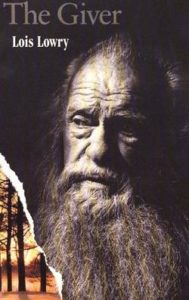
The Giver by Lois Lowry
The worst part of holding the memories is not the pain. It’s the loneliness of it. Memories need to be shared.
“Lowry creates a chilling, tightly controlled future society where all controversy, pain, and choice have been expunged, each childhood year has its privileges and responsibilities, and family members are selected for compatibility.
As Jonas approaches the ‘Ceremony of Twelve,’ he wonders what his adult ‘Assignment’ will be. Father, a ‘Nurturer,’ cares for ‘newchildren’; Mother works in the ‘Department of Justice’; but Jonas’s admitted talents suggest no particular calling. In the event, he is named ‘Receiver,’ to replace an Elder with a unique function: holding the community’s memories—painful, troubling, or prone to lead (like love) to disorder; the Elder (‘The Giver’) now begins to transfer these memories to Jonas. The process is deeply disturbing; for the first time, Jonas learns about ordinary things like color, the sun, snow, and mountains, as well as love, war, and death: the ceremony known as ‘release’ is revealed to be murder. Horrified, Jonas plots escape to ‘Elsewhere,’ a step he believes will return the memories to all the people, but his timing is upset by a decision to release a newchild he has come to love. Ill-equipped, Jonas sets out with the baby on a desperate journey whose enigmatic conclusion resonates with allegory: Jonas may be a Christ figure, but the contrasts here with Christian symbols are also intriguing.
Wrought with admirable skill—the emptiness and menace underlying this Utopia emerge step by inexorable step: a richly provocative novel.”
–Kirkus Reviews, March 1, 1993
*
The Great America Read TV Schedule
“Who Am I?”
Tuesday, September 18, 8:00-9:00 p.m. ET
Explore the ways that America’s best-loved novels answer the age-old question, “Who Am I?” From life lessons to spiritual journeys, these books help us understand our own identities and find our place in the world.
“Heroes”
Tuesday, September 25, 8:00-9:00 p.m. ET
Follow the trials and tribulations of some of literature’s favorite heroes. From Katniss Everdeen to Don Quixote, examine how the everyday hero and the anti-hero find their inner strength, overcome challenges and rise to the occasion.
“Villains and Monsters”
Tuesday, October 2, 8:00-9:00 p.m. ET
Learn why literature’s most notorious villains began behaving badly. Many weren’t born evil, but became that way when faced with some of the same choices we make every day. See what these villains can teach us about our own dark impulses.
“What We Do For Love”
Tuesday, October 9, 8:00-9:00 p.m. ET
Fall in love with some of literature’s most beautiful romances and explore the many forms of love, from family to passion to the unrequited type. Learn how America’s best-loved novels reflect the things we do for love.
“Other Worlds”
Tuesday, October 16, 8:00-9:00 p.m. ET
Take a magical journey to another world through some of America’s best-loved novels. From Middle Earth to Lilliput, the trials and tribulations of these alternate universes help us to better understand our own world.
“Grand Finale”
Tuesday, October 23, 8:00-9:00 p.m. ET
America’s best-loved novel is revealed.

